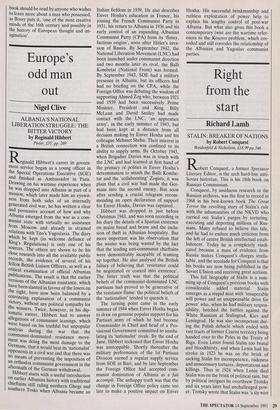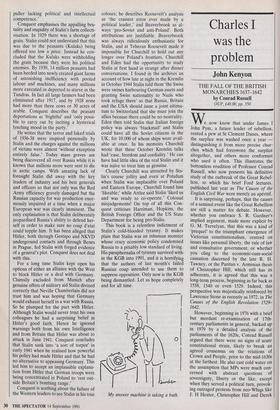Right from the start
Richard Lamb
STALIN: BREAKER OF NATIONS by Robert Conquest Weidenfeld & Nicholson, £18.99 pp.346 Robert Conquest, a former Spectator Literary Editor, is the arch hard-line anti- Soviet historian. This is his 18th book on Russian Communism.
Conquest, by assiduous research in the Russian archives, was the first to record in 1968 in his best-known book The Great Terror the revolting story of Stalin's rule with the inhumanities of the NKVD who carried out Stalin's purges by torturing, executing and deporting millions of Rus- sians. Many refused to believe this tale, and he had to endure much criticism from the left of centre British intellectual estab- lishment. Today he is completely vindi- cated because a mass of evidence from Russia makes Conquest's charges irrefu- table, and the accolade for Conquest is that his books are now being published in the Soviet UInion and receiving great acclaim.
This full biography of Stalin is a sum- ming up of Conquest's previous books with considerable added material. Stalin emerges as a stupid man with 'insuperable will power and an unappeasable drive fOr power' who, when he had military respon- sibility, botched the battles against the White Russians at Stalingrad, Kiev and Leningrad. He was also incompetent dur- ing the Polish debacle which ended with vast tracts of former Czarist territory being handed over to the Poles in the Treaty of Riga. Even Lenin found Stalin too brutal and bloodthirsty, and when Lenin had his stroke in 1923 he was on the brink of sacking Stalin for incompetence, rudeness and unnecessary tortures, deportations and killings. Thus in 1924 when Lenin died Stalin was on the brink of political ruin, but by political intrigues he overthrew Trotsky and six years later had unchallenged pow- er. Trotsky wrote that Stalin was `a sly wire puller lacking political and intellectual competence.'
Conquest emphasises the appalling bru- tality and stupidity of Stalin's farm collecti- visation. In 1929 there was a shortage of grain. Stalin could not understand that this was due to the peasants (Kulaks) being offered too low a price. Instead he con- cluded that the Kulaks were withholding the grain because they were his political enemies. By 1930, 14 million peasants had been herded into newly created giant farms of astonishing inefficiency with pooled labour and machines, and many millions more executed or deported to starve in the Tundras. In fact all large farmers had been eliminated after 1917, and by 1928 none had more than three cows or 30 acres of arable. Conquest describes the peasant deportations as 'frightful' and 'only possi- ble to carry out by inciting a hysterical lynching mood in the party.'
He writes that the terror and faked trials of 1936-38 were inspired personally by Stalin and the charges against the millions of victims were almost 'without exception entirely false.' Today mass graves are being discovered all over Russia while it is known that millions more were sent to die in arctic camps. With amazing lack of foresight Stalin did away with the key leaders of industry and his best generals and officers so that not only was the Red Army efficiency gravely damaged but the Russian capacity for war production enor- mously impaired at a time when a major European war was clearly imminent. The only explanation is that Stalin deliberately jeopardised Russia's ability to defend her- self in order to make sure no coup d'etat could topple him. It has been alleged that Hitler, both through Gestapo and NKVD underground contacts and through Benes in Prague, fed Stalin with forged evidence of a general's plot. Conquest does not deal with this.
For a long time Stalin kept open his options of either an alliance with the West to block Hitler or a deal with Germany.
Clumsily excluded from Munich after genuine offers of military aid Stalin divined correctly that Neville Chamberlain did not trust him and was hoping that Germany would exhaust herself in a war with Russia.
So he plumped for the pact with Hitler.
Although Stalin would never trust his own colleagues he had a surprising belief in Hitler's good faith. Hence he ignored warnings both from his own Intelligence and from Britain that Hitler was about to attack in June 1941. Conquest concludes that Stalin sank into 'a sort of torpor' in early 1941 when he realised how powerful his policy had made Hitler and that he had no alternative to appeasing Germany. This led him to accept an implausible explana- tion from Hitler that German troops were being concentrated in Poland to 'rest out- side Britain's bombing range.'
Conquest is scathing about the failure of the Western leaders to see Stalin in his true colours; he describes Roosevelt's analysis as 'the crassest error ever made by a political leader,' and Beaverbrook as al- ways 'pro-Soviet and anti-Poland'. Both attributions are justifiable. Beaverbrook was always ridiculously enthusiastic for Stalin, and at Teheran Roosevelt made it impossible for Churchill to hold out any longer over Poland's frontiers. Churchill and Eden had the opportunity to study Stalin at first hand in strange after dinner conversations. I found in the archives an account of how late at night in the Kremlin in October 1944 Stalin told them 'the Swiss were swines harbouring German assets and granting Swiss nationality to Nazis who took refuge there' so that Russia, Britain and the USA should issue a joint ultima- tum to Switzerland that she must join the allies because there could be no neutrality.
Eden then told Stalin that Italian foreign policy was always 'blackmail' and Stalin could have all the Soviet citizens in the UK, for 10,000 of whom ships were avail- able at once. In his memoirs Churchill wrote that these October Kremlin talks had 'ease, freedom and cordiality.' He can have had little idea of the real Stalin and it was naive to treat him as genuine.
Clearly Churchill was attracted by Sta- lin's coarse jollity and even at Potsdam when Stalin was implacable over Poland and Eastern Europe, Churchill found him likeable;' while Attlee said Stalin 'liked us and was ready to co-operate.' Colossal misjudgements! On top of all this Con- quest criticises Harriman, Hopkins, the British Foreign Office and the US State Department for being pro-Stalin. This book is a relentless indictment of Stalin's cold-blooded tyranny. it makes plain that Stalin was an inhuman monster whose crazy economic policy condemned Russia to a pitiably low standard of living. His paraphernalia of tyranny survived with- in the KGB into 1991, and it is horrifying that the authors of last month's failed Russian coup intended to use them to suppress opposition. Only now is the KGB being dismantled. Let us hope completely and for all time.
My answer machine is taking a bath.



















































 Previous page
Previous page